I remember feeling frustrated at times with how quickly we'd secure foster homes for puppies, or mommy-puppy combos while working at Miami Dade Animal Services, circa 2010.
Reason Being: During my time at MDAS, I'd spend days of intense networking and socializing a number of high-risk, larger adult dogs at any given time, doing everything in my power to get these dogs adopted, fostered, or into a reputable rescue (rescues like Miami Dogs on the Move, or Big Dog Ranch) in time.
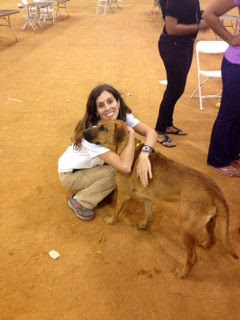 |
| This was one of those 'at-risk big dogs' I helped get out, Mega Event, Miami, 2012, thx to Tracy Deering for fostering this guy! |
With many, I had success. With others, time ran out, and I lost some dear 4-legged friends to euthanasia. But when it came to puppies and/or mommies with pups, we had much better luck with finding fosters or rescue fast. It could be disheartening, working on a specific at-risk dog for days, just to have a pair of cute puppies come in, and be fostered out the same day of their arrival. Naturally I was happy for the puppies and mommies... but I'd wonder, 'why is it so much harder for these awesome, 60 lb., adult dogs?!'
And don't get me wrong, sometimes we had trouble finding fosters for moms and pups too... it could be a challenge to secure enough fosters at any given time, no matter how precious the pet(s)!
However, the risks that puppies in shelters face are immediate and deadly. So it's crucial they get out super-flash-fast, ideally before their paws even touch a cage floor (they should never touch the regular shelter floor).
2 of Gypsy's puppies, with us, Oct.
Puppies shouldn't be vaccinated prior to 6 weeks of age, some institutions may vaccinate a little earlier, some a little later. And they need a series of 3 DAPP vaccines to be considered protected against the most deadly puppy viruses: parvo and distemper.
Are you seeing the big picture yet? -Puppies enter shelters with very little (possibly from mother's milk) to no immunity to deadly viruses. -Couple this with extremely high stress levels, which cripples the immune system, and you have a recipe for dying puppies. I know, those 2 words together are truly heartbreaking.
But it's true. I've lived it. I've seen it, time and time again when working in shelters. And It's brutal. -See the link to one puppy's story from my time at MDAS at the end of this blog. Puppy Feet! -One of Missy's puppies, with us, Aug 2021 Missy and pups while in our home
When pregnant bitches or nursing mothers enter a shelter, it can be even more dire.
Primary Reason Being: Space.
If you've ever been around a mommy dog, you know how protective they are of their young. If you haven't had the joy of witnessing this, please just take my word for it. And they're especially protective of their babes around other dogs they don't know- and this is exactly what they're to confront in a traditional shelter setting. They simply cannot be in a kennel run with the general dog population; it's not an option. So what's the shelter to do? Most shelters do not have 'nursing or pregnant bitch wards.' I'm sure some fancy ones do, but I don't personally know of any, and even then, space will become an issue.
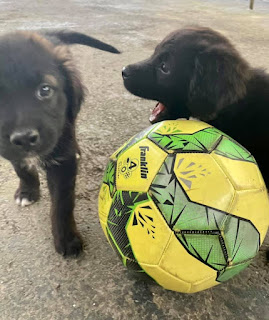 |
| 2 of a litter of 7 that came to us, no mom, summer 2021 |
When a pregnant mom would enter a shelter during my most recent tenure of sheltering (2010-2014), she'd be euthanized or spayed, and puppies would be aborted. There's also a blog about one pregnant dog's story on my shelterworkersblog.blogspot.com, but sincerely, I don't even want to look at it to share the link: it's still too painful.
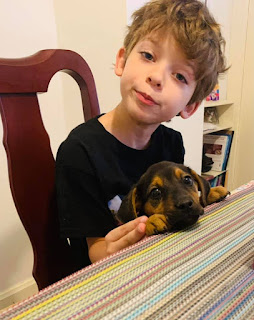 |
| Sammy with Chocolate Chip, summer 2021 |
When a mommy with puppies enter a shelter, if the puppies are big enough, they're typically put in a separate run from the mommy... and they're quickly adopted out. Mommy on the other hand can wait for days, or weeks to be adopted. If she's not adopted, she's euthanized.
And mommy dogs in shelters are typically not 'highly adoptable.' Their behavior oftentimes isn't the greatest, as you might imagine. -Ending up abandoned, living in a kennel, around strangers, with people walking by you, pointing, smiling or frowning, passing you by, all day, after having your pups pulled from your engorged tits can make one pretty grumpy (desperate barking, standoffish-ness, depression are common traits of a mommy dog in a shelter).
 |
| Lilly, the 1st mommy we took in as a rescue, April 2021 |
Now the reader understands the graveness of 'mommies and puppies,' or 'mommies-to-be' in shelters. They must get out, and they must get out fast.
This is why we do everything in our power to say YES to mommy dogs and puppies. It's my past, it's what I know, that makes this yes so crucial. When I get the call or email for a mommy dog and pups, I cannot rest until either we can rescue, or I know that another qualified rescue has stepped up.
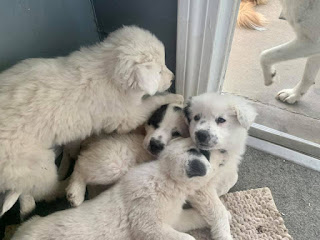 |
| 4 of Lilly's pups, April 2021 |
There is significant risk involved in taking in puppies. We never fully know their background. They could be harboring sickness when they enter our foster-based-rescue. This is a risk that scares me, but that I'm apparently willing to take on.
I follow all precautions possible:
-I always ask about any signs of, or exposure to, illness prior to committing to moms and puppies, or just puppies.
-I closely monitor puppies in their first few days with us.
-Puppy area is cleaned and disinfected 4-6 times/day with OdoBan https://smile.amazon.com/dp/B01N9QDTFA/ref=cm_sw_r_apan_glt_fabc_JR2PSY89N4RZZ82WJTS5 (feel free to buy some for yourself, or for the rescue!)
-I deworm with pyrantel within 48 hours of puppy arrival and do the initial DAPP vaccine at the 6-7 week mark
-I wear separate shoes and clothes in the puppy area (ones that don't go outside our puppy area) to try assure I'm not tracking virus in or out
-I do not do 'puppy adoption events;' that is stressful on puppies, and can decrease the immune system's functionality
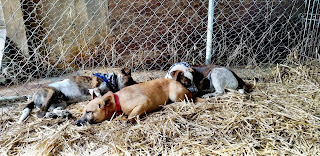 |
| 2 of the 5 puppies foster Tricia took in, Summer 21' |
By The Numbers:
We've taken in 8 litters (5 of the 8 with mommies) in 8 months (April 2020-November 2020).
This is mind-boggling even to me, and I couldn't have taken in 1/2 of these without committed, awesome fosters!
All remained healthy. All were adopted out into forever homes (no returns of puppies or mommies). All are loved.
During this time we've adopted out approximately 80 pets in all (adult dogs and cats included).
Our most current litter, Julie, in foster care with Shellie, November, 2021
I promise to do a Part II to this blog which will share the pattern we've seen emerge with these mommy dogs... people always wonder, 'where do they come from? how does a big, pregnant dog end up wondering the streets?'
These are topics we'll delve into, and to which you'll get answers.
Ways to Help:
Donate via PayPal https://www.paypal.com/donate/?hosted_button_id=YKQDYGBMWK2KG
Assign us as your Amazon Smile Partner https://smile.amazon.com/gp/chpf/homepage/ref=smi_chpf_redirect?ie=UTF8&ein=36-4966263&ref_=smi_ext_ch_36-4966263_cl
Visit our Amazon Wishlist
Mark your calendars to visit facebook.com/thepawandfeatherplan for #GIVINGTUESDAY to have any donation matched by Facebook: 8 a.m. on 11/30/21
Related Articles:
A blog I wrote while working at MDAS, a letter to Brownie, one puppy: https://shelterworkers.blogspot.com/2013/12/brownie-pup.html
https://www.rover.com/blog/deadly-preventable-dog-diseases/



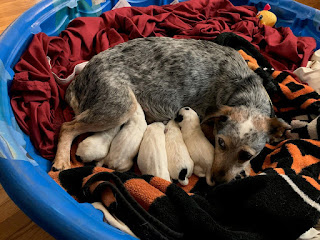
Comments
Post a Comment